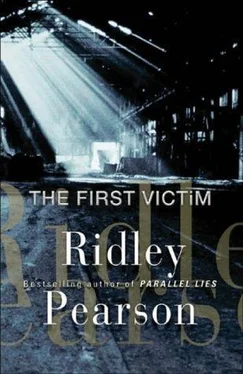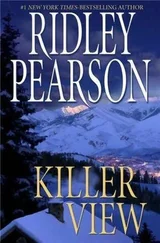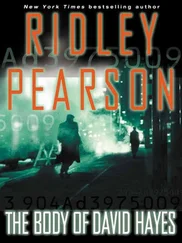Ridley Pearson - The First Victim
Здесь есть возможность читать онлайн «Ridley Pearson - The First Victim» весь текст электронной книги совершенно бесплатно (целиком полную версию без сокращений). В некоторых случаях можно слушать аудио, скачать через торрент в формате fb2 и присутствует краткое содержание. Жанр: Триллер, на английском языке. Описание произведения, (предисловие) а так же отзывы посетителей доступны на портале библиотеки ЛибКат.
- Название:The First Victim
- Автор:
- Жанр:
- Год:неизвестен
- ISBN:нет данных
- Рейтинг книги:3 / 5. Голосов: 1
-
Избранное:Добавить в избранное
- Отзывы:
-
Ваша оценка:
- 60
- 1
- 2
- 3
- 4
- 5
The First Victim: краткое содержание, описание и аннотация
Предлагаем к чтению аннотацию, описание, краткое содержание или предисловие (зависит от того, что написал сам автор книги «The First Victim»). Если вы не нашли необходимую информацию о книге — напишите в комментариях, мы постараемся отыскать её.
The First Victim — читать онлайн бесплатно полную книгу (весь текст) целиком
Ниже представлен текст книги, разбитый по страницам. Система сохранения места последней прочитанной страницы, позволяет с удобством читать онлайн бесплатно книгу «The First Victim», без необходимости каждый раз заново искать на чём Вы остановились. Поставьте закладку, и сможете в любой момент перейти на страницу, на которой закончили чтение.
Интервал:
Закладка:
‘‘I’m turning the TV on for you,’’ she announced. ‘‘That was Sheila Hill. You know I really resent having to call her by her rank. Why does it bother me so much that my husband reports to a woman with half his experience, half his brains and more than half again his paycheck? She wants you tuned in to Channel Four right away. You’re supposed to be interested.’’
Boldt entered the living room dripping wet with a towel wrapped around his waist. Ten minutes later he was creating his own lane and passing traffic behind the incessant strobe of the dash-mounted-bubble gum light while talking on the cellular.
‘‘We’re going to be flooded with calls,’’ Boldt warned LaMoia. ‘‘We burned her and she burned us back. She just sank us and the investigation.’’
‘‘Options?’’ a groggy LaMoia asked.
‘‘We move ahead of the tidal wave that’s certain to come. If we don’t, it’ll trap us and drown us. Call Coughlie over at INS. We want
a list of any and every possible sweatshop location in the city.’’ ‘‘That’s all I tell him?’’ ‘‘Tell him we’re going to start kicking some doors in, and that we
want-no, we need-his foot to lead the way. That ought to get a rise out of him.’’
CHAPTER 40
Vacant structures were a scourge to any city because they ended up crack houses, gang lairs and arson targets. It was their designation within this last category that made them of interest to the Seattle Fire Department. SFD tracked all structures vacant more than one calendar year. Boldt knew this from his involvement with an arson investigation two years earlier.
Within half an hour of his request, Boldt had on his desk a ten-page list of every known vacant structure in King County. He faxed this to Dr. Virginia Ammond, who had been compiling her own list of former canneries for him. Cross-referencing this list against her own, Ammond pinpointed two possible structures-both vacant, both former canneries.
When Brian Coughlie called and offered a federal search warrant to help speed up the process, Boldt accepted. Without any formal mention of it, they had formed a task force, and although their superiors-Hill and Talmadge, respectively-might fight over the concept, Boldt and Coughlie were determined to get down to business.
The only glimpse of the structure’s interior came as a huge garage door lifted to admit a Ford minivan, so new that it still carried a dealer’s paper permit taped to its rear window. One of Boldt’s squad pulled the permit number using a pair of binoculars and called it downtown in order to run it. Boldt sat in the passenger seat of Coughlie’s Buick, a considerable step up from his own Chevy.
‘‘This video you guys got hold of? You thinking about sharing that?’’ Coughlie asked.
‘‘That could probably be arranged. The PA’s office might have a thing or two to say about it.’’
‘‘I’m not asking the PA’s office,’’ Coughlie said.
‘‘You probably should,’’ Boldt said. He didn’t fully trust Coughlie for the same reasons Daphne had cited. Other than Mama Lu, Cough-lie had been the only one outside of SPD to whom Boldt had mentioned the freighter’s ship captain. A few hours later the captain had been found dead. His frustration with the INS, his suspicions of Coughlie and Talmadge, in particular, had started then. Regardless of how far-fetched it had seemed at the time, millions of dollars were at stake, and no one could be counted out. If Coughlie hadn’t produced the search and seizure warrant as he had, he wouldn’t have been part of this operation. Law enforcement made for strange bedfellows.
When the temporary dealer permit came back stolen, Boldt asked Coughlie, ‘‘Can you give me any reason a sweatshop would need a hot minivan?’’
‘‘To transport their workers,’’ the INS man stated matter-of-factly. ‘‘I can’t think of a vehicular bust we’ve made in the last three years that didn’t involve either a stolen vehicle or stolen plates. The thing about what we do?’’ he asked rhetorically. ‘‘None of these people exist. Can you imagine? They don’t exist. There is no paperwork on them: no birth certificates, credit information, tax records-no nothing. That’s what we’re up against: phantoms. We pull ’em over; they scatter into the streets and we have nothing to follow. . because they are nothing. A confirmed stolen vehicle? In terms of probable cause this bust just got a whole lot easier.’’
‘‘Agreed,’’ Boldt said.
‘‘Have you been shot at lately?’’
‘‘Only by my captain,’’ Boldt said, causing Coughlie to laugh.
‘‘I’m from the George Patton school,’’ Coughlie told him, reaching into the backseat for a Kevlar vest. ‘‘I don’t believe in sending my guys into any battle that I don’t engage in myself.’’
‘‘You don’t have kids,’’ Boldt observed.
‘‘No kids, no family, no no one,’’ Coughlie replied dryly. He strapped on a throat-mounted microphone that straddled his voice box, and he then inserted an earpiece. The device allowed hands-free conversation between team members. He toyed with a small black box that he then clipped to his belt. ‘‘You guys with me?’’ he spoke for the benefit of his team. ‘‘Yeah, we’re going in.’’
The bullet-resistant vest was not physically heavy, but its presence was. It meant battle; it meant risk. For Boldt a vest was a symbol of youth. It had been well over a year since he had worn one. Ironically, as he approached the hangar’s north door at a run behind his own four heavily armored Emergency Response Team (ERT) personnel, he caught himself worrying about his hands, not his life. He didn’t want to smash up his piano hands in some close quarters skirmish. One of his few selfish pleasures in life was the piano-his evening practice and the occasional happy hour performance at Joke’s On You. To break a finger or a wrist was to dislocate more than bone and ligament, it was to sever him from personal expression.
Unlike a typical SPD covert operation, Boldt had no way to monitor communications. His own ERT officers were outfitted with hands-free radios, but they were short sets for both LaMoia and Boldt, who were to rely on hand signals. Absurdly, in the name of government secrecy, the feds used their own protected radio frequencies, meaning that even though they wanted to, the two teams, INS and ERT, could not hear the other’s radio traffic: hand signals were used to communicate between the two digitally equipped units. Well aware that they had thrown this together a little too quickly, perhaps hastily, and that he was relying on men he’d never met, Boldt kept pace with the ERT operative in front of him, eyes ever vigilant for the hand signals that controlled his movement and thought process. When that hand reached up, fingers open, and then closed firmly, cementing into a fist, Boldt stopped and squatted down. When it made numbers-four and four-Boldt paired up with another of the ERT operatives and stepped to the left of the door.
The eight men crouched. The door was knocked in with a ram, and they streamed into the building, the line dividing in two. Boldt followed the yellow letters POLICE printed onto the black nylon vest in front of him.
It was a chop shop, not a sweatshop, the enormous area littered with automotive parts and vehicles in various stages of disassembly, the air reeking of welding torch and burning paint. Boldt’s team took shelter behind the disembodied shell of a gutted pickup truck. Coughlie’s team ducked behind a pile of automobile doors.
The first shot to ring out came from the far side of the room. Men scattered in all directions. Once provoked, law enforcement returned fire. Some of their targets dove to the floor, arms spread. The rest fled like rats.
Читать дальшеИнтервал:
Закладка:
Похожие книги на «The First Victim»
Представляем Вашему вниманию похожие книги на «The First Victim» списком для выбора. Мы отобрали схожую по названию и смыслу литературу в надежде предоставить читателям больше вариантов отыскать новые, интересные, ещё непрочитанные произведения.
Обсуждение, отзывы о книге «The First Victim» и просто собственные мнения читателей. Оставьте ваши комментарии, напишите, что Вы думаете о произведении, его смысле или главных героях. Укажите что конкретно понравилось, а что нет, и почему Вы так считаете.












